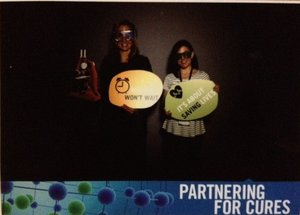NFCA’s Kristin Voorhees, MA, Director of Healthcare Initiatives, explains how advancing research lies in the hands of people living with celiac disease.
By Kristin Voorhees, MA, NFCA Director of Healthcare Initiatives
Last month, NFCA President Alice Bast and I headed north to New York City to attend Partnering for Cures 2013, a conference hosted by FasterCures, acenter of the Milken Institute and an action tank determined to remove barriers to medical progress.
Partnering for Cures brought together leaders from across sectors in medical research including academic institutions, technology innovators, philanthropists, nonprofit patient advocacy groups and the pharmaceutical industry to speed up the dialogues needed to drive solutions in healthcare and science. No matter their background, all participants shared this in common: an energy to spur change for patients. And, at the end of the day, aren’t we all patients?

NFCA President Alice Bast (left) and
Healthcare Relations Manager Kristin Voorhees
at Partnering for Cures.
After spending two days filled with lectures, meet and greets and presentations, the take home message that I consider to be the most relevant for patients with a gluten-related disorder is this: Each person makes a difference and it’s critical that patients understand their role in research.Here’s what we can do:
Now, you may be thinking, “How does this apply to celiac disease? We have a treatment – the gluten-free diet. What else do we need to think about?” And, I will assure you that there is plenty to think about!
Once you become familiar with the ins and outs of the gluten-free diet, I encourage you to go one step further and seek out the field of science.
It’s more critical now than ever to understandhow celiac disease works. We are on the cusp of a pharmaceutical revolution in celiac disease treatment. A vaccine, pill or other pharmaceutical treatment is no longer a pipe dream; it’s a very real possibility.
It’s time that we move beyond simply talking about the gluten-free diet to understanding both the root of the autoimmune condition and the scientific advances that are providing the opportunity to change the face of celiac disease. We as celiac disease patients have an incredible opportunity to participate in the development of treatments that could help millions of our peers.
Our goal at NFCA is to empower patients to take responsibility for their own health by providing the education and tools necessary to maximize their health and quality of life.
I encourage everyone to learn more by taking one or more of the following actions today:
Opt-in to stay up-to-date on the latest news.
Yes, I want to advance research No, I'd prefer not to